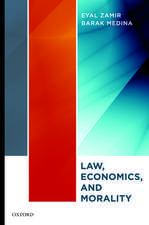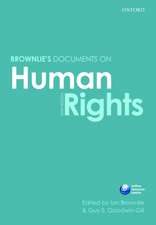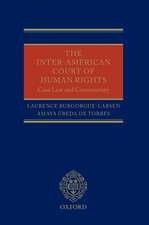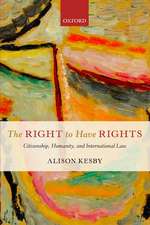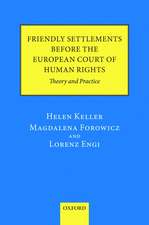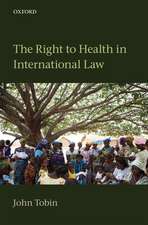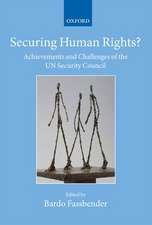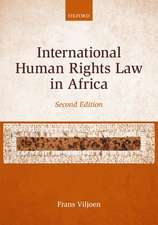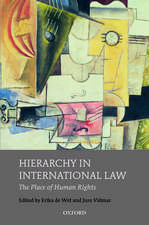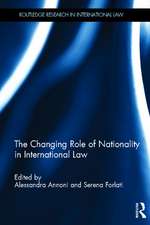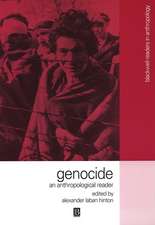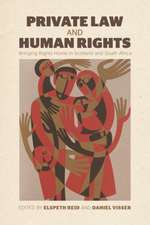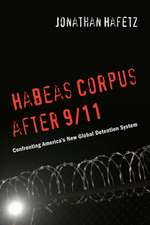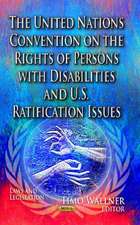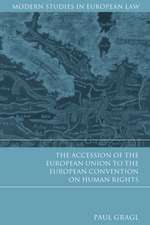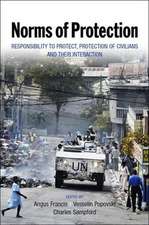The Justice Facade: Trials of Transition in Cambodia
Autor Alexander Hintonen Limba Engleză Paperback – 22 mar 2018
| Toate formatele și edițiile | Preț | Express |
|---|---|---|
| Paperback (1) | 268.92 lei 31-38 zile | +52.97 lei 7-13 zile |
| OUP OXFORD – 22 mar 2018 | 268.92 lei 31-38 zile | +52.97 lei 7-13 zile |
| Hardback (1) | 761.61 lei 31-38 zile | |
| OUP OXFORD – 22 mar 2018 | 761.61 lei 31-38 zile |
Preț: 268.92 lei
Preț vechi: 296.95 lei
-9% Nou
Puncte Express: 403
Preț estimativ în valută:
51.46€ • 53.73$ • 42.59£
51.46€ • 53.73$ • 42.59£
Carte tipărită la comandă
Livrare economică 24-31 martie
Livrare express 28 februarie-06 martie pentru 62.96 lei
Preluare comenzi: 021 569.72.76
Specificații
ISBN-13: 9780198820956
ISBN-10: 019882095X
Pagini: 304
Dimensiuni: 159 x 234 x 15 mm
Greutate: 0.51 kg
Editura: OUP OXFORD
Colecția OUP Oxford
Locul publicării:Oxford, United Kingdom
ISBN-10: 019882095X
Pagini: 304
Dimensiuni: 159 x 234 x 15 mm
Greutate: 0.51 kg
Editura: OUP OXFORD
Colecția OUP Oxford
Locul publicării:Oxford, United Kingdom
Recenzii
Hinton succeeds brilliantly in both denaturalizing the assumptions embedded in the transitional justice imaginary and disclosing how variously positioned actors appropriate and reframe transitional justice proceedings.
an important contribution to the transitional justice literature that will also be interesting to broader audiences interested in international relations, international law, peacebuilding or development.
The Justice Facade is an engaging and original contribution to trauma studies. ... Hinton's heterogeneous work parallels the hybridity of global justice and the result is a persuasive and exciting new addition to the field.
In ... The Justice Facade: Trials of Transition in Cambodia, Hinton explains the origin of the Extraordinary Chambers and analyzes the significance of their operations. Hinton spent considerable time in Cambodia, attending Duch's trial and subsequent proceedings against other Khmer Rouge figures. Hinton also interviewed participants and visited nongovernmental organizations that sought to inform the Cambodian public about the Extraordinary Chambers. Hinton's detailed account of the work of these civil society organizations is perhaps the greatest contribution that The Justice Facade adds to the existing literature on the Extraordinary Chambers.
[Hinton's] method and argument contributes to transitional justice - and particularly international criminal justice - scholarship and has implications for human rights, peacebuilding, and development studies in Cambodia. The Justice Facade is also compelling reading, with Hinton's attention toward lived experience offering a richly emotive and personalised account of the dynamic impact of the Democratic Kampuchea period.
The concept of 'the justice facade', among others offered in the book, is very useful in describing the idealised imaginaries which alienate lived experiences on the ground ... Hinton asks readers to unpack their own transitional justice imaginaries and their facade-like renderings to consider more deeply the meanings and purposes of 'justice', 'peacebuilding' and transitional justice measures. This book is therefore a very welcome contribution to critical transitional justice studies.
Behind the façade of the utopia of contemporary transitional justice, Alexander Laban Hinton finds a different set of personal realities. His extraordinary ethnography and phenomenology of the processes unleashed by Cambodias attempt to reckon with the genocidal past is the richest treatment of what transitional justice means as lived experience, beyond the familiar distractions of the promotional advertising and the liberal democratic teleology of the field.
The Justice Façade is a ground-breaking book. Hinton provides a remarkable, closely observed study of transitional justice. Bringing his longstanding experience in post-genocide Cambodia to bear, he skilfully overturns much conventional wisdom about what it takes to come to terms with historic injustice. With this highly imaginative book, Hinton advances the study and practice of transitional justice in innumerable ways. The Justice Façade is essential reading for anyone intent on exporting the rule of law.
there is much to ponder in this book ... Any students of transitional justice who see the Cambodian experience as a chapter in a larger, evolving volume will find much to advance their thinking.
an important contribution to the transitional justice literature that will also be interesting to broader audiences interested in international relations, international law, peacebuilding or development.
The Justice Facade is an engaging and original contribution to trauma studies. ... Hinton's heterogeneous work parallels the hybridity of global justice and the result is a persuasive and exciting new addition to the field.
In ... The Justice Facade: Trials of Transition in Cambodia, Hinton explains the origin of the Extraordinary Chambers and analyzes the significance of their operations. Hinton spent considerable time in Cambodia, attending Duch's trial and subsequent proceedings against other Khmer Rouge figures. Hinton also interviewed participants and visited nongovernmental organizations that sought to inform the Cambodian public about the Extraordinary Chambers. Hinton's detailed account of the work of these civil society organizations is perhaps the greatest contribution that The Justice Facade adds to the existing literature on the Extraordinary Chambers.
[Hinton's] method and argument contributes to transitional justice - and particularly international criminal justice - scholarship and has implications for human rights, peacebuilding, and development studies in Cambodia. The Justice Facade is also compelling reading, with Hinton's attention toward lived experience offering a richly emotive and personalised account of the dynamic impact of the Democratic Kampuchea period.
The concept of 'the justice facade', among others offered in the book, is very useful in describing the idealised imaginaries which alienate lived experiences on the ground ... Hinton asks readers to unpack their own transitional justice imaginaries and their facade-like renderings to consider more deeply the meanings and purposes of 'justice', 'peacebuilding' and transitional justice measures. This book is therefore a very welcome contribution to critical transitional justice studies.
Behind the façade of the utopia of contemporary transitional justice, Alexander Laban Hinton finds a different set of personal realities. His extraordinary ethnography and phenomenology of the processes unleashed by Cambodias attempt to reckon with the genocidal past is the richest treatment of what transitional justice means as lived experience, beyond the familiar distractions of the promotional advertising and the liberal democratic teleology of the field.
The Justice Façade is a ground-breaking book. Hinton provides a remarkable, closely observed study of transitional justice. Bringing his longstanding experience in post-genocide Cambodia to bear, he skilfully overturns much conventional wisdom about what it takes to come to terms with historic injustice. With this highly imaginative book, Hinton advances the study and practice of transitional justice in innumerable ways. The Justice Façade is essential reading for anyone intent on exporting the rule of law.
there is much to ponder in this book ... Any students of transitional justice who see the Cambodian experience as a chapter in a larger, evolving volume will find much to advance their thinking.
Notă biografică
Alexander Hinton is Founder and Director of the Center for the Study of Genocide and Human Rights, Professor of Anthropology, and UNESCO Chair on Genocide Prevention at Rutgers University. The American Anthropological Association selected Hinton as the recipient of the Robert B. Textor and Family Prize for Excellence in Anticipatory Anthropology. Hinton was listed as one of 'Fifty Key Thinkers on the Holocaust and Genocide' and is a past President of the International Association of Genocide Scholars. Hinton has received fellowships from a range of institutions and was a Member of the Institute for Advanced Study in Princeton. Most recently Hinton was a convener of the international "Rethinking Peace Studies" initiative and served as an expert witness at the Khmer Rouge Tribunal.

